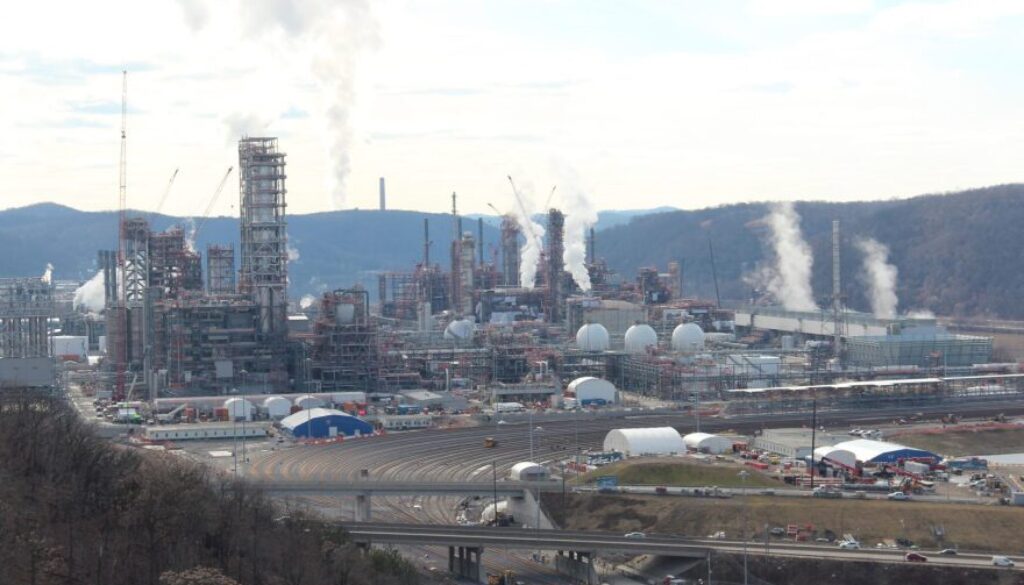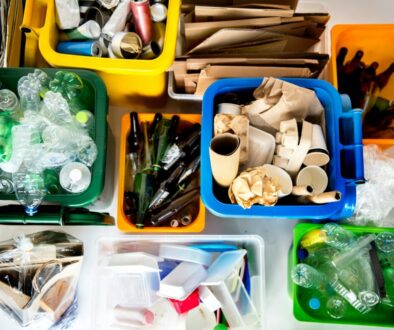Shell hit with $10 mln penalty over air pollution
By Dana Drugmand
Pennsylvania state regulators have ordered a Shell subsidiary to pay nearly $10 million to resolve multiple air permit violations committed by the company’s new petrochemical facility located about 30 miles northwest of Pittsburgh.
The move comes amidst mounting frustration and outrage from area residents and environmental organizations over the plant’s release of hazardous chemicals and foul odors and disruptive flaring – a process designed to burn up invisible harmful hydrocarbons produced through plant operations – in recent months.
Shell’s 386-acre facility, located on the banks of the Ohio River in Beaver County, Pennsylvania near the town of Monaca, is the largest plastics production plant in the Northeast and Shell’s largest petrochemical facility outside of the Gulf Coast. The plant uses a process called “cracking” to convert the natural gas liquid ethane into the petrochemical ethylene, a building block for fossil fuel-derived plastic production.
Since Shell announced the startup of operations in November, the $6 billion plastics production facility has racked up 11 notices of violation – all pertaining to air quality – from the Pennsylvania Department of Environmental Protection (DEP), including four last week alone.
On Wednesday the state announced a consent order and agreement with Shell Chemicals Appalachia, the subsidiary operating the plant. Under the arrangement, the company has formally acknowledged its violations of the state’s Air Pollution Control Act and agreed to pay $4.9 million as a civil penalty plus another $5 million for projects to “benefit community environment and health.” Shell also agreed to make equipment repairs and take “all reasonable and feasible measures” to mitigate excess emissions, along with paying monthly civil penalties for future exceedance of emissions limits for the rest of 2023.
State officials invoked Pennsylvania’s constitutional right to clean air and water in their announcement of the agreement, which they characterized as an action that holds Shell accountable.
“My Administration will continue to work with Shell to ensure they live up to this agreement, and we will be prepared to hold them accountable for any future violations,” Pennsylvania Gov. Josh Shapiro said in a statement.
Critics, however, say the state’s enforcement action is too little too late and perpetuates a “pay to pollute” system. Several groups wrote to the DEP in February calling for “immediate action” and a halt on the plant’s operations. The plant is also facing a lawsuit filed in federal court earlier this month over its repeated air permit violations.
“We cannot allow another entity to engage in pay-to-pollute behavior that comes at the expense of our region’s residents and allow the fines to be perceived as charitable donations to our communities. Our region deserves better,” said Matthew Mehalik, executive director of the Breathe Project.
The $10 million Shell must pay is a tiny fraction of its profits. Mehalik likened it to the price of parking ticket.
According to Anaïs Peterson, petrochemical campaigner at Earthworks, the state’s action is “long overdue yet far too little for a facility that has spent the past six months malfunctioning and dumping illegal and excess air pollution on the local community.”
The plant-emitted pollution includes volatile organic compounds (VOCs), nitrogen oxides (NOx), carbon monoxide, particulate matter, and other compounds. VOCs and NOx are precursors of ground-level ozone, a criteria pollutant under the Clean Air Act. Exposure to VOCs and NOx can cause difficulty breathing, irritation of the eyes, nose, and throat, and other health problems.
The Shell plant also emits toxic chemicals such as benzene and toluene. Passive air monitors at the facility recorded particularly high benzene levels stemming from a malfunction at the wastewater treatment system on April 11. Benzene is a known carcinogen and the World Health Organization says that “no safe level of exposure can be recommended.”
The consent order and agreement reveals that Shell sent a revised report to DEP on April 18 “stating that it would generate approximately 60 Mg/year of benzene in its waste and wastewater and requested that the Department utilize the compliance option” under federal regulations.
“The overwhelming and toxic pollution residents have been exposed to has already harmed this community – there is no price tag that will allow for this to be acceptable,” Andie Grey of the watchdog group Eyes on Shell and a resident who lives three miles from the plant, said in a statement.
The state DEP did not immediately respond to a request for comment, nor did it respond to a request for clarification on what is meant by “projects” intended to benefit the environment and local communities and whether community members would be involved in determining what those would be.
According to the consent order and agreement, such projects are to be “determined in collaboration with [DEP} and with the participation of the Department’s Office of Environmental Justice, to benefit the environment, health and quality of life of the community near the Facility.”




